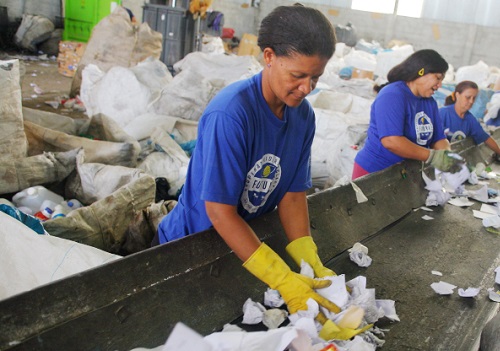In our ongoing series highlighting the work of corporate citizens giving back to their communities, we’re delighted to profile Johnson & Johnson, a company playing a pioneering role supporting social entrepreneurs in the UK. In this interview SEE Change sat down with Ian Walker, senior director of the Global Community Impact team about their varied work, its impact and the importance of companies to step up and contribute to their communities through social entrepreneurship.
Briefly describe the social entrepreneurial initiatives in which Johnson & Johnson is involved
Johnson & Johnson has been working with social enterprises since 2013 in the UK, and we officially launched our ‘Social Impact through Procurement’ programme in July 2014. We work with social enterprises all over the world, from South Africa to Brazil. For example, in Brazil, Project Phoenix is aimed at raising standards for ethical working conditions.
In the UK, one of the social enterprises we work with is called See Detail. They employ individuals with an autism spectrum condition or Asperger’s Syndrome in the field of software testing. By working with See Detail, Johnson & Johnson has helped fund three permanent roles while also helping to drive autism awareness and improve the health and emotional well-being of See Detail’s employees.
Another great example is our work with Inside Job Productions, an award-winning film and media production company. Inside Job reinvests its profits into a Production Trainee scheme which provides paid work and training opportunities for people who might otherwise struggle to find or keep a job. Recently, one of its Production Trainee scheme employees, Tallulah, featured on the BBC, sharing her struggle with mental illness and the positive impact Inside Job has had on her life.
What inspired you to get involved in this way? What needs did you want to help tackle and why?
As the world’s largest and most broadly-based healthcare company, we recognise our responsibility to help transform lives in under-served communities through our business expertise in healthcare, wellbeing and science. We’re in the business of helping people to live happier and healthier lives, and our mandate to make a positive impact on communities and societies at large originates from our Credo, which was founded in 1943 by Robert Wood Johnson. Our Credo guides our decision making and challenges us to put the needs and well-being of the people we serve first.
Not only are we using our size for good, we are also leading the agenda and changing the direction of health through our work with social enterprises. Working with social enterprises enables Johnson & Johnson to make a difference to society and impact people’s lives for the better through our business decisions and actions, and a shared value agenda which is both good for business and good for society. It also helps to inspire our employees by working for a company that is contributing to society. This is what genuine responsibility is all about.
Tell us about the impact of your initiatives and how you measure that impact?
To date, Johnson & Johnson has worked with 17 social enterprises in the UK either directly or through Tier 1 suppliers. In 2017, Johnson & Johnson was able to create or support 34 hard to reach jobs in the sector. In the UK, we’ve committed to allocating £15m (3 percent) of purchasing spend with social enterprises to help support 150 jobs for those furthest from the job market by the end of 2020.
We are also one of the founding partners of the Buy Social Corporate Challenge (BSCC) which has now reached the two-year mark. The Buy Social Corporate Challenge, led by Social Enterprise UK (SEUK), calls on UK businesses to spend £1 billion with social enterprises, with £45m achieved to date. Directly or indirectly, BSCC has created 329 jobs at social enterprises and through corporate contracts and social enterprises have been able to reinvest £2.98 million into their social missions. We’re proud to have contributed to this and be a part this success.
In your opinion, how important is it for the corporate sector to get involved in social enterprise? Have you seen a corporate shift in that direction?
I think it’s extremely important. Johnson & Johnson is different from many of its competitors and businesses operating in the social enterprise space. Particularly in Scotland, the social enterprise space is dominated by NGO’s or government departments. It is very unusual to find a company like Johnson & Johnson making an active and positive contribution that is not based around a desire to enhance profits.
The Buy Social Corporate Challenge has led the way that corporates start using and interacting with social enterprises. However, we need others from the private sector to join our ranks and share not just our philosophy, but recognise the valuable work that social enterprises do, and understand that their procurement can be a real driving force for social change.
The responsibility lies not only with corporates, but with governments too. We’re therefore lucky in the UK to have government legislation like the Public Service (Social Value) Act 2012 on our side. The recent launch of the Civil Society Strategy – which sets out how the government would like to work alongside the social sector to build a future in which social enterprises can thrive – is also a positive step forward. This is not the first government strategy on social enterprise, and it is vital that strategy is pushed through and acted upon.
What is your hope for the future of social enterprise and the involvement of the corporate community?
Meeting the needs of future generations requires all of us to be at our best. We are delighted to see the positive impact that social enterprises are having on the lives of those who face barriers to the job market. We want to see social enterprises flourish because we understand the immense value they have in in terms of overall societal benefit and developing individuals where ever they are in the world. Social enterprises help build a future that works for everyone and so we must increase our efforts to support and promote the life-changing work they enable.
Ian Walker is a Senior Director in the Global Community Impact team at Johnson & Johnson.


